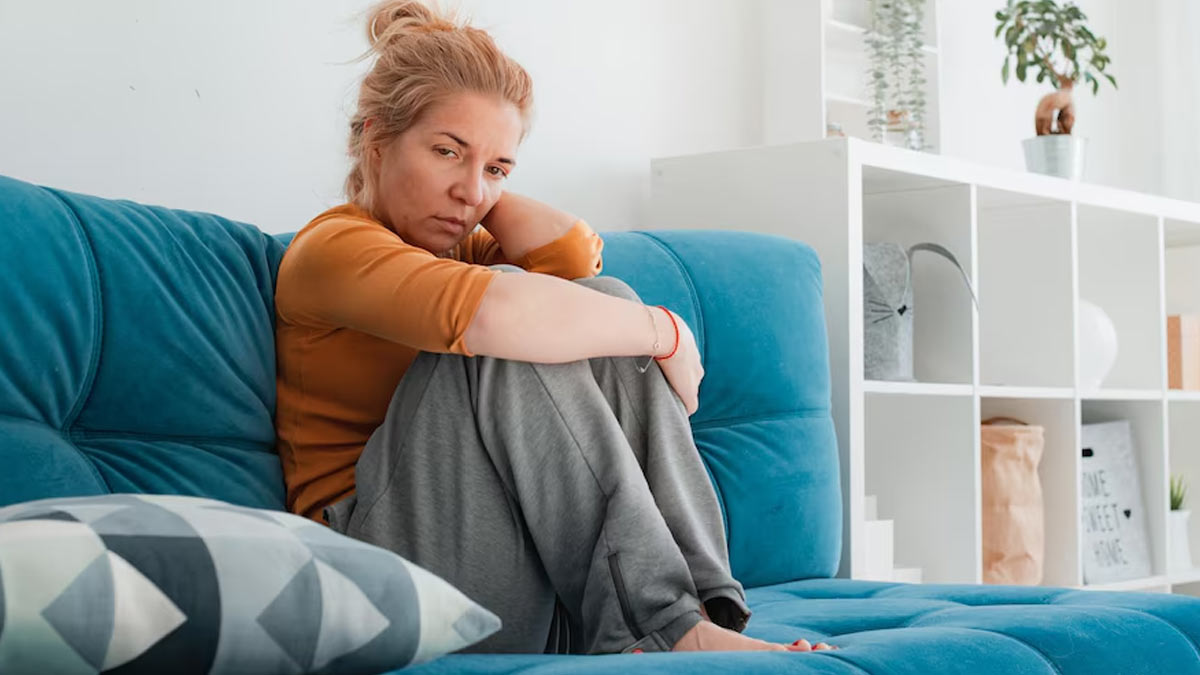
Menopause is a significant transition in a woman’s life characterised by the end of the menstrual cycle. While menopause is a natural biological process, it is marked by various physical and mental changes in the body. One of the most concerning issues associated with menopause is the increased risk of depression. However, understanding the link between menopause and depression holds the key to understanding, managing, and preventing its impact. We spoke to our expert Dr Nitika Sobti, Gynaecologist and Obstetrician, Director, Cloudnine Hospital, Gurugram, who explained the link between menopause and depression and how to manage it.
Table of Content:-

“Menopause is the time in a woman’s life when she has not had menstrual periods for 12 consecutive months. This can happen around the ages of 45-55, but can also happen earlier or later in life”, said Dr Sobti.
According to the Penn Ovarian Aging Study, an estimated 20% of women experience depression during menopause, with depressive symptoms peaking during perimenopause and decreasing post-menopause. The Harvard Study of Moods and Cycles found that women entering perimenopause were twice as likely to develop major depression.
Also Read: Mental Health Matters: Experts Explain Impact Of Menopause On Mental Health
Causes of Depression during Menopause

According to a 2023 study, menopause heightened susceptibility to anxiety and depression, possibly due to changes in oestrogen levels that impact serotonin and GABA. There are additional risk factors for menopausal decompensation with depression, including underlying neuroticism and concurrently occurring unfavourable life events.
Dr Sobti listed some of the causes of depression during menopause as follows:
- Hormonal Changes: The primary reason behind menopause-related depression is the hormonal imbalance, especially oestrogen and progesterone. These hormones are responsible for regulating emotional well-being and mood regulation.
- Physical Symptoms: Some of the physical changes during menopause, including weight gain and hot flashes can affect a woman’s self-esteem, which further contributes to depression.
- Sleep Disturbances: Menopause often causes sleep disturbances, including night sweats and insomnia. Lack of sleep increases anxiety, and depression which can overwhelm you and is challenging to come out from.
- History of Depression: Women who have a history of depression are more likely to experience depression symptoms. This is further exacerbated by hormonal changes during this period.
- Psychological and Social Factors: Menopause often coincides with other changes during this stage of life, including ageing and career transitions. These factors tend to add to the already increasing emotional burden and can trigger depression.
Also Read: Menopause Causes Weight Gain And More: Expert Debunks Myths About Menopause
Solutions for Managing Menopause-Related Depression
Dr Sobti listed the management measures for menopause-related depression as follows:
Hormone Replacement Therapy (HRT)
HRT can reduce or alleviate menopausal symptoms that can lead to anxiety or depression. However, before deciding on getting HRT, it is recommended to consult your doctor, as this procedure may not suit every woman.
Lifestyle Changes
A healthy lifestyle can significantly boost mood and minimise depression symptoms to promote overall well-being during menopause. A few lifestyle changes during this stage may include:
- Balanced Diet: A colourful diet rich in nutrients, including vegetables, fruits, whole grains, and lean protein is essential during menopause to stabilise mood and promote good health. Along with this, you can consult your doctor in suggesting some supplements, such as vitamin D, magnesium, or a multivitamin in your daily routine to compensate for the loss in bone strength, muscle mass, and nutrient deficiency, which might add to the anxiety symptoms.
- Regular Exercise: Physical exercises, such as yoga, weight lifting, running, swimming, or simply brisk walking release endorphins, which help improve mood and reduce depression symptoms.
- Adequate Sleep: Adequate sleep in routine is crucial to keeping your mood shift in check. This also includes improving the quality and comfort of sleep.
Antidepressant Medications
There are certain antidepressant medications that your doctor may prescribe during menopause if you experience depression. However, it is important to understand that self-medication can have harmful effects and is never advisable.
Mind-Body Practices
Mind-body balancing practices of the likes of meditation, yoga, or deep breathing exercises are found effective with depression-related issues during menopause and also promote holistic well-being during this period, preventing depression from getting severe.
Message From The Expert

Dr Sobti highlighted, “Many women experience mood swings during the menstrual phase, which can significantly affect their happiness and overall health. When you add in midlife stress factors like taking care of ageing parents and raising children, depression rates among women going through menopause scale upwards. Various social, psychological, and physiological factors may all be at play simultaneously, collectively raising the risk of depression during menopause.”
Bottomline
Dr Sobti concluded, “While medical solutions and a holistic approach to battling menopause-related depression are effective, it is often recommended to talk about your issues with someone you trust. A family member, friend, or even support group can help you with emotional support and minimise your feeling of isolation. This helps in uplifting your mood and finding a new purpose and courage to fight these changes and their associated problems. Finding support from someone can also help you identify tools that you can leverage to cope with depression and promote your overall well-being.”
[Disclaimer: This article contains information provided by an expert and is for informational purposes only. Hence, we advise you to consult your expert if you notice any physical or mental health issues to get the necessary treatment.]
Also watch this video
Read Next
WWE Fame Brandi Rhodes Reveals Stage 4 Endometriosis Diagnosis; Symptoms Of Stage 4 Endometriosis
How we keep this article up to date:
We work with experts and keep a close eye on the latest in health and wellness. Whenever there is a new research or helpful information, we update our articles with accurate and useful advice.
Current Version